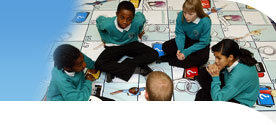



The revised programme of study recognises the importance of engaging pupils in thinking through, and responding to, real dilemmas, issues and problems facing individuals and communities. It encourages pupils to develop new ways of thinking and reflecting on a wide range of issues, ideas and concepts, including democracy and justice, rights and responsibilities, and identities and diversity.
The issues explored may be contentious and controversial where the rights of individuals or groups compete or conflict. Pupils should investigate the evidence, ask questions and develop judgements by exploring opinions and values other than their own.
Making connections is an important aspect of critical thinking and enquiry, and includes recognising the relationship between citizenship concepts and pupils' own or others' actions.
Citizenship has always been a way of exploring the world around us and our place within it. This is emphasised in the revised programme of study through the key concept of identities and diversity, as well as through exploring what it means to be a citizen in the UK. Through this exploration pupils gain a sense of the features, traditions and cultures that shape Britain today, Britain's role in Europe and the global community, and the value of living in a diverse and democratic society.
The introduction of critical thinking and enquiry, taking informed and responsible action, and advocacy and representation provides a clear structure in which pupils can develop the skills to be successful in public life and engage with the wider world. Pupils have the opportunity to work with others in a variety of contexts. They identify, negotiate, plan and take action to address political and social issues. The purpose of such action is clear - to try to have influence, make change or resist unwanted change in both school-based and wider community contexts.
The revised programme of study provides pupils with opportunities to participate in different types of formal and informal discussion, debate and voting. It encourages them to research and analyse a range of ideas and sources of information critically before taking action or participating in debate.
The revised programme of study provides opportunities for pupils' experience of citizenship to be more connected to their communities and the wider world through the topics and issues they investigate and take action on. One way of achieving this is through pupils working with those in law, the public service, the voluntary sector, politics and the media. This can have a lasting impact on their understanding of the contexts and values for making decisions and taking different forms of action such as campaigning.
The revised programme of study requires that pupils develop advocacy and representation skills for contexts and purposes beyond the classroom, where they may need to try to persuade or influence decision-makers.
Citizenship requires that pupils engage with the local and wider community in different ways. It allows them to see the relevance of what they are learning and why they are participating, which can be extremely motivating.